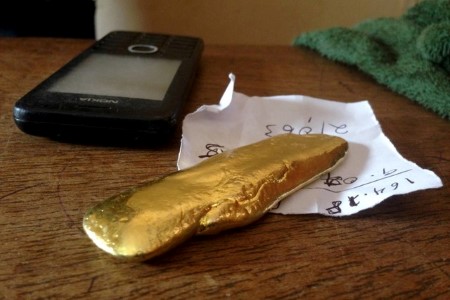




Policy Rate Updates: BSP outlook — cloudy with a chance of rate cut
 DOWNLOAD
DOWNLOAD

January Economic Update: Growth slows, prices rise
 DOWNLOAD
DOWNLOAD

Inflation Update: Up, up, and away?
 DOWNLOAD
DOWNLOAD


Gold resumes retreat despite soft jobs report as traders book profits

Gold fell to a one-month low on Friday despite weaker-than-expected US jobs data, extending a correction from last month’s stellar rally as investors booked profits while geopolitical risks eased.
Spot gold fell 0.1% to USD 2,300.38 per ounce as of 1:45 p.m. ET (1745 GMT), and logged its second consecutive weekly fall.
US gold futures settled little changed at USD 2,308.6.
Prices quickly gave up gains after jumping as high as USD 2,320.78 immediately after the release of data showing US nonfarm payrolls increased by 175,000 jobs last month, lower than economists’ forecast of 243,000.
“Gold’s initial surge on the Goldilocks employment report attracted a fair amount of profit-taking, which suggests bulls are growing more cautious after April’s remarkable rally and a rather ordinary response after Powell’s friendly comments on Wednesday,” said Tai Wong, a New York-based independent metals trader.
Though the jobs data reinforced expectations that the Federal Reserve will start cutting interest rates this year, which should be supportive for zero-yield bullion, this prompted investors to switch to riskier assets instead.
The sentiment is “risk on”, translating into lesser demand for gold, said Chris Gaffney, president of world markets at EverBank.
Gold also seemed to largely ignore a resultant slide in US Treasury yields.
Safe-haven bullion has retreated 5.7%, or about USD 140, since hitting a record high of USD 2,431.29 in April, driven by flare-ups in the Middle East and strong central bank buying.
“There are concerns that gold could retreat further if Asian buying doesn’t re-appear. It could fall as far as USD 2,150 without doing any real damage to the long-term chart,” Wong added.
Caught in gold’s slipstream, silver fell 0.9% to USD 26.46, and marked a weekly decline.
However, platinum gained 0.8% to USD 957.05, and posted a weekly gain, while palladium also rose 0.8% to USD 943.37.
(Reporting by Rahul Paswan and Harshit Verma in Bengaluru; editing by Arpan Varghese, Tasim Zahid, and Alan Barona)
This article originally appeared on reuters.com





 By Reuters
By Reuters